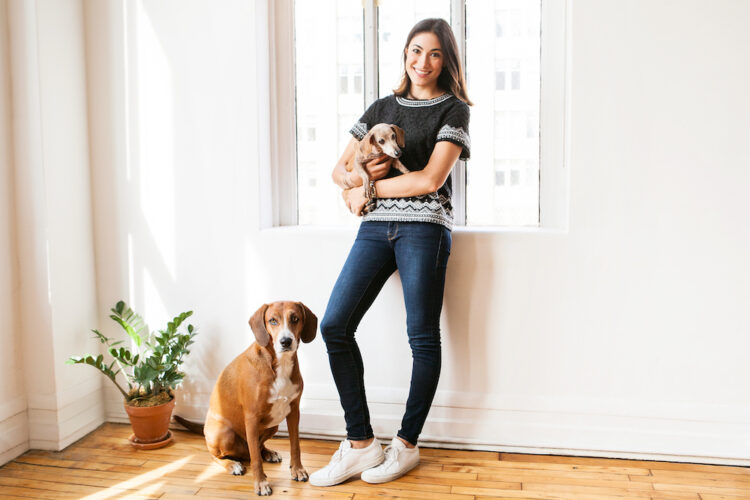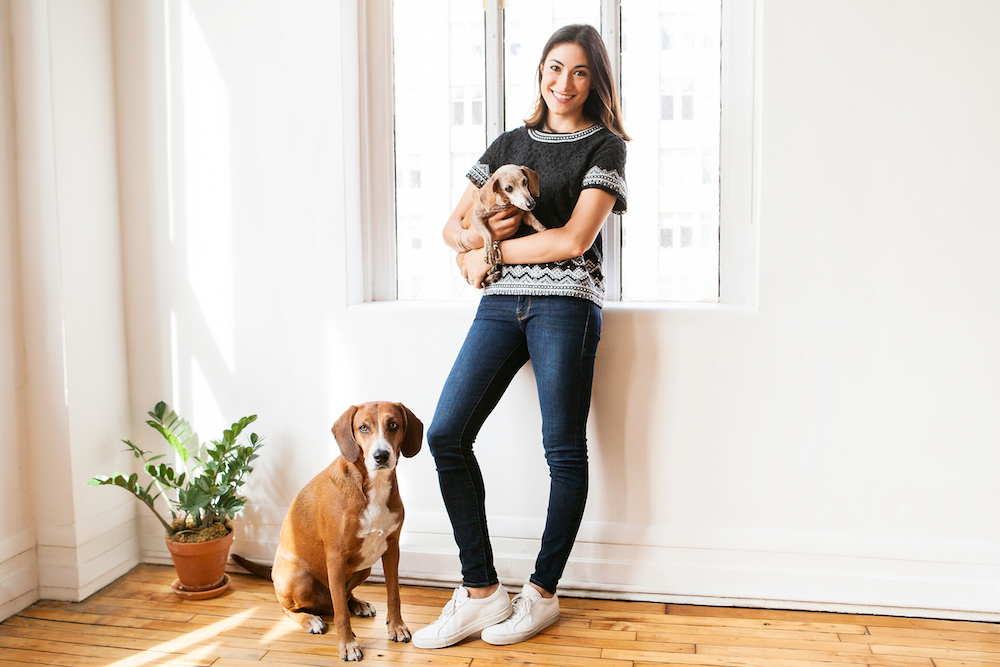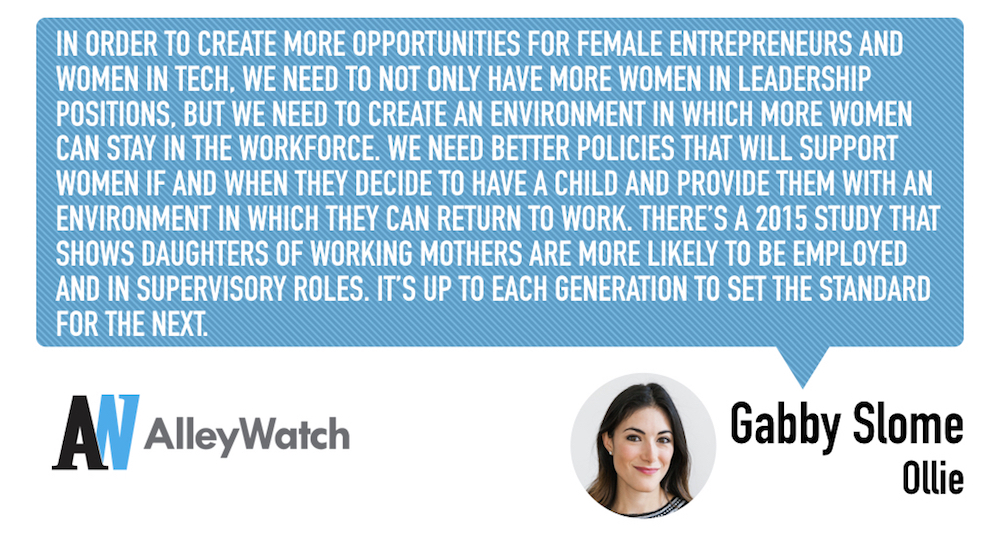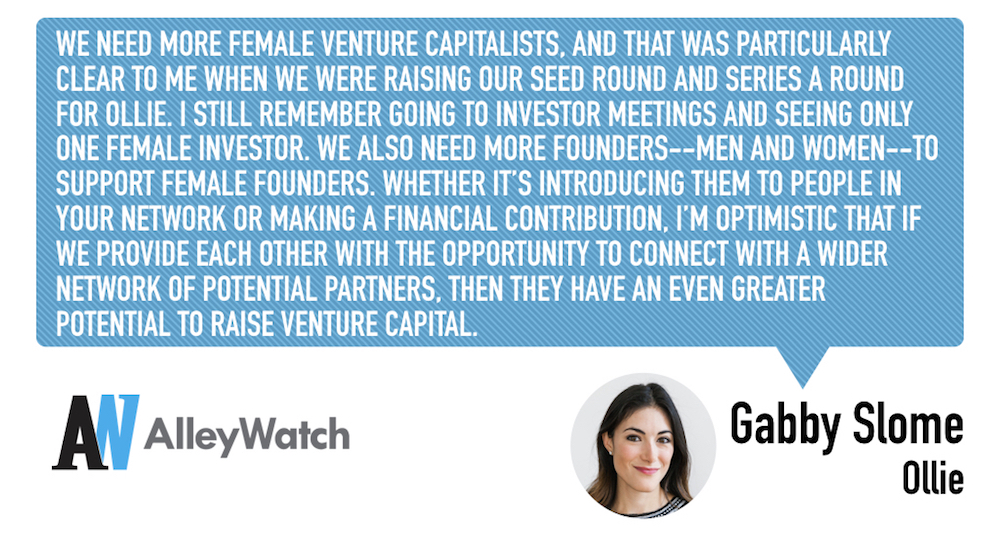Are you a woman in NYC Tech and interested in participating in this series? Make sure to read the whole article…
Much has been said and written about the lack of women in the tech sector, be it as investors (or associates), founders, or in management positions at major companies. Is the problem the old boys network – or that success in technology is seen as a young man’s game? In this series, we speak with some of the top women in tech in New York as they discuss the challenges they face, the perceptions that need to be changed and the work that’s being done – or not – to help to promote women in tech.
Today we speak with Gabby Slome, the cofounder and CXO of the largest canine meal delivery service Ollie, which has experienced a 500% growth rate over the past year. Slome received her MBA at Columbia Business School in 2014 and held executive roles at startups like Vente-Privée U.S.A. and Primary.com. She also served as an Entrepreneur in Residence at Primary Venture Partners. Slome has been featured in several publications including Forbes, Entreprenuer, and she is a regular contributor to POPSUGAR.
AlleyWatch is very excited to share our interview with this dynamic entrepreneur, pet-owner, and businesswoman behind the booming business that aims to be the “kibble killer” of the $29B pet food industry.
Gabby Slome of Ollie
What’s your background and how did you develop your career as a female entrepreneur in the NYC tech ecosystem?
As the daughter of two entrepreneurs – my dad owns an investment company and my mom founded a nonprofit – I saw them both work equally hard and become equally successful, and that very much impacted my career path. Yet, I also saw the challenges my mom particularly faced, and I think that’s one of the reasons why I wanted to be an entrepreneur. Not enough women have a seat at the table, and so instead of trying to find one… I wanted to make my own seat.
So my career path led me to executive roles at startups like Vente-Privée U.S.A. and Primary.com, and eventually, I served as an Entrepreneur in Residence at Primary Ventures. It was when my rescue dog, Pancho, started gaining too much weight on what I thought was premium kibble that I started to investigate what was really in his food. What I found was disturbing: food that was full of preservatives, artificial ingredients, mystery meat, and, oftentimes, low-quality ingredients that were unfit for human consumption. After seeing a marked improvement after one vet suggested making food for Pancho, I saw an opportunity to create freshly cooked, high-quality food for dogs…and that’s how the concept of Ollie was born.
 Along with two cofounders who faced similar challenges with their pets, we launched Ollie in October 2016 out of a need to make and deliver healthier dog food. Less than two years later, Ollie is now the largest canine meal delivery service that makes freshly cooked, human-grade food that’s customized to each dog’s nutritional needs.
Along with two cofounders who faced similar challenges with their pets, we launched Ollie in October 2016 out of a need to make and deliver healthier dog food. Less than two years later, Ollie is now the largest canine meal delivery service that makes freshly cooked, human-grade food that’s customized to each dog’s nutritional needs.
What are the advantages of being a woman in tech?
While the tech industry remains male-dominated, communities supporting female entrepreneurs and women in tech are growing. From venture capitalists specifically funding female-founded companies to female-only coworking spaces, women are leading the charge in creating more inclusive, empowering environments where we can help each other succeed. In an era where female entrepreneurs and women in tech are becoming more the norm, being one makes me feel like I’m in a cohort where we’re all in it together, and there’s a true sense of community.
What can be done to further promote female entrepreneurs and women in tech in New York?
In order to create more opportunities for female entrepreneurs and women in tech, we need to not only have more women in leadership positions, but we need to create an environment in which more women can stay in the workforce. We need better policies that will support women if and when they decide to have a child and provide them with an environment in which they can return to work. There’s a 2015 study that shows daughters of working mothers are more likely to be employed and in supervisory roles. It’s up to each generation to set the standard for the next.
The female entrepreneur cohort is also a small, but powerful and growing group. The more attention that can be brought to the fact that only 2% of funding is given to female-founded companies, the more something can be done about it. I think the more we have venture capitalists like Primary Ventures, Canaan, and Lerer Hippeau Ventures, backing successful companies with a female founder, the more we can drive this change.
We also need to make sure that we – men and women – don’t box women into a stereotype. Bias comes from both sides, and I can speak to this from personal experience. I’ve faced blowback because I don’t fit the typical “girlboss” story and not the “perfect” female founder ideal. I have two male cofounders and I’m the chief experience officer (not the chief executive officer,) so I don’t fit the quintessential “female founder” narrative. As a result, I’ve been turned away from opportunities because my entrepreneurial experience isn’t female enough. When society continues to box anyone into a stereotype – whether it’s because of your gender or race – then it’s harder for them to get out of it.
What is diversity to you and do you see it evolving in tech?
More than race and ethnicity, diversity encompasses people from all different backgrounds and experiences. And having diversity among your team and leadership is a business advantage.
There’s diversity among my cofounders and I, which helps us with our success. Not only do our difference in ages span 10 years, but I’m the only female, I happen to be the youngest and I’m a new parent. My cofounder Alex is from France and has twin teenage daughters, and my cofounder Randy is Latino and has a seven-year-old daughter. We all come from different backgrounds and are in different life stages, and the one common denominator we have is our love for pets. As a result, our diversity gives us an advantage at better understanding the different types of customers we’re reaching out to.
The landscape in technology is already changing when it comes to diversity…albeit slowly. We’re seeing more female founders, more entrepreneurs who are moms, and more leaders of color. Whether it’s gender, race, ethnicity, or age, I’m hopeful that the momentum in diversity will continue.
Why do you think it’s important that women retain, grow, and develop into senior roles within their organizations?
As I mentioned, in order to create more opportunities for female entrepreneurs, we need them to stay in the workforce. Companies are generally founded out of a need to address a pain-point for
consumers and with half of the purchasing demographic made up of women, it makes sense to have equal representation of women who are leading companies.
In a period of a year you launched Ollie and had your first child. How did you manage all that?
One thing’s for sure, I didn’t manage “all that” on my own. I had a lot of help at home and at work. First and foremost, I knew that finding the right child care was the most important hire I could make not only for myself but also for my company. Without someone I could trust, I could never fully focus on my job. Child care is truly the work that makes all work possible. Meanwhile at work, I learned to depend on my team more and allow them to take on more responsibility.
I also learned to adapt, and adapt again. Managing startup life and mom life concurrently means a new challenge each week. So, adaptability – to employees, the marketplace, customers – is key to growing a business (and a family!).
And finally, I’ve accepted the fact that there is no work-life balance. Just like being a parent isn’t a 9-to-6 job, neither is being an entrepreneur.
You’ve successfully raised funding for your business from investors. What tips do you have for fellow female founders?
Identify a solution to a real issue you’re passionate about. As a former equestrian, health and wellness has always been important to me, and I believe that food is the best preventative medicine for health – for humans and for dogs. The light bulb moment for me was when I started investigating what was really in pet food after my rescue dog gained too much weight very quickly. I love that Ollie is disrupting the $30B pet food industry by showing pet parents the health benefits of freshly-cooked dog food. In fact, a 2013 study showed that dogs who eat freshly-cooked food live three years longer!
I’d also say to align yourself with people who have the same values and be bold in asking for more from them. It goes without saying to do your research and identify potential partners and investors who will be able to better understand the brand you’re building and the pain point you’re solving. In Ollie’s case, they were investors who were pet parents and passionate about health and wellness. No one is ever going to offer you more than what you’re asking for too, so know your company’s worth and your worth, and don’t be afraid to ask for more. You have nothing to lose.
And as you ask others to invest in your company, be sure to invest in yourself. You have to be in the right mindset to take on everything coming at you at once, and for me, working out is my version of meditation. It’s my time to decompress, be reflective of the day, and can sometimes be a source of inspiration.
Do you think fundraising for your business would be more difficult if you did not have a male cofounder?
Companies who invested in Ollie saw the advantage of the diverse leadership we brought. It’s our diversity and the different viewpoints we bring, along with our results-oriented mindset and mutual respect for each other that made us stand out and be more attractive to venture capitalists.
It’s statically proven that women-led companies are more successful than their male counterparts. Why do you think they still only get 2% of funding available for new ideas?
Plain and simple: there are not enough female venture capitalists.
People tend to invest in things they understand. If the majority of venture capitalists are men, and a female entrepreneur is trying to raise money for a female-focused business, they may not necessarily understand the need for that business.
We need more female venture capitalists, and that was particularly clear to me when we were raising our seed round and Series A round for Ollie. I still remember going to investor meetings and seeing only one female investor. We also need more founders – men and women – to support female founders. Whether it’s introducing them to people in your network or making a financial contribution, I’m optimistic that if we provide each other with the opportunity to connect with a wider network of potential partners, then they have an even greater potential to raise venture capital.
Please tell us about a few organizations that you are involved with or respect that are promoting women in tech.
As a new mom and young entrepreneur, it’s particularly important to me to connect with others who are also going through this journey. So, I recently joined Heymama, a community for modern working moms, where I can also help other moms and entrepreneurs learn how to scale a business and raise money.
I also love The Wing’s mission of advancing women through its community.
How much do you think casual sexual harassment and misconduct affects a woman’s career?
I think you’d be hard-pressed to find a woman who’s never experienced any type of casual sexual harassment, misconduct, or gender bias. According to a 2016 report from the Equal Employment Opportunity Commission, 40 percent of American women have experienced sexual harassment at work…and I’d bet that the number is even higher than that. However, I think I’ve been fortunate where I haven’t experienced this as acutely as other women have.
Any type of discrimination – gender, sexual, racial – is going to impact you. You can be the strongest woman but feel completely diminished when it happens to you, and I can imagine it’s something that stays with you for the rest of your life.
I’m optimistic that with the #metoo movement, we’re turning something that once was rarely spoken about to a powerful change in our society.
What can men do to support this movement and/or participate in this discussion?
My first mentor was a man, and more than anyone, he pushes me to ask for what I need to reward the work I’m doing. I still call him for advice all the time. I share this because I believe it’s important for men to mentor women, and for women to mentor men. By surrounding yourself with diversity – whether it’s a different gender, race, or background – you’ll open yourself up to a wider network, different viewpoints, and a wealth of knowledge…and that’s helpful for mentors and mentees.
Men can also support the #metoo movement by speaking up on behalf of women. If you see or hear something – even if it is in “locker room conversations,” don’t brush it off. You can’t achieve gender equality when only one gender is speaking up.
And finally, lead by example and set the right tone. Be observant in office meetings about who’s speaking up and make sure that all voices are being equally heard and valued.
The team at AlleyWatch believes it’s important to have an inclusive discussion around the challenges facing women in tech along with highlighting the work of the female entrepreneurs that have made NYC one of the best places for women in tech according to some recent studies. That’s why we are running this series that showcases women in tech in New York.
If you are a female founder in NYC working in tech and interested in participating in the series please visit this link or click on the image above.
Please feel free to pass this on to any women in NYC that you feel should be considered for the series. Thank you.







